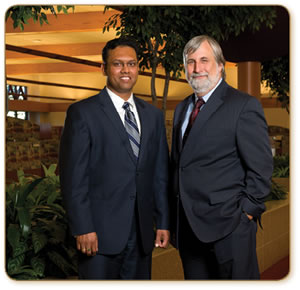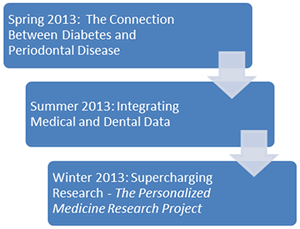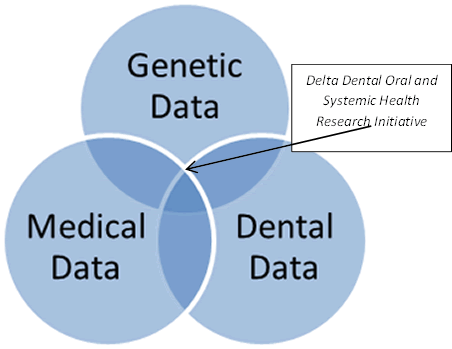Spotlight on Research: Marshfield Clinic and Marshfield Clinic Research Institute
Medical research is the key to health care innovation. Virtually all physician-patient encounters have some component directly or indirectly connected to medical research.
 Dr. Amit Anharya of Marshfield Clinic (left) and Dr. Fred Eichmiller of Delta Dental of Wisconsin
Dr. Amit Anharya of Marshfield Clinic (left) and Dr. Fred Eichmiller of Delta Dental of Wisconsin Medical research provides:
-
Understanding of why diseases happen
-
Improved ways to diagnose diseases
-
New therapies to treat, control and sometimes cure complex diseases
How then, does a research project come into being and why is Marshfield Clinic Research Institute uniquely positioned to contribute to studies in a manner not found even in much larger institutions?
These questions are best answered by exploring a research project currently underway at Marshfield Clinic Research Institute called the Delta Dental Oral and Systemic Health Research Initiative. This article, the first in a series of three, will explore how this project was formulated to study the interplay that is thought to exist between oral and health diseases.
The Connection Between Diabetes and Periodontal Disease
"The Delta Dental Oral and Systemic Health Research Initiative utilizes a number of research tools uniquely available to scientists at Marshfield Clinic as well as the staff expertise built over years of thoughtful and purposeful work," says Murray Brilliant, Ph.D., the project's principal investigator. " The resulting information may have real and lasting impact and importance to our understanding and management of oral health and its impact on certain systemic diseases."
According to the American Diabetes Association, over 8 percent of Americans, or more than 25 million people, have diabetes. Patients with diabetes can experience a wide range of complications ranging from heart disease, stroke, blindness, to kidney disease.
Dental problems, including periodontal disease, are also very common in the United States. According to the National Institutes of Health, 8.5 percent of adults age 20 to 64 have periodontal disease, more commonly known as gum disease.
Recently, scientists have begun to realize that diabetes and oral health are linked. Preliminary findings suggest that not only do diabetic patients have a higher risk of dental problems, but patients with dental problems may also have a higher risk of becoming diabetic.
Traditionally, when studying the causes of disease, the first step is to identify groups of people with a particular disease. When this group is identified, researchers can then begin the process of analyzing data about a particular disease within this group.
Why, then, is it so difficult to study the linkage between diabetes and periodontal disease? Neither of these health problems is new, and both are very common.
The answer is that diseases of the mouth and diseases of the body are addressed by different care teams – physicians treat diabetes and dentists treat periodontal disease. Because of this, researchers could not bring together sets of data for medical
and dental patients.
However, this is changing and Marshfield Clinic is at the forefront of this change.
Unique research tools providing unparalleled opportunities
Scientists involved with the
Oral and Systemic Health Research Project utilize innovative research tools only available at Marshfield Clinic. The Clinic created its own electronic medical record system, CattailsMD, which has been in use system-wide since 1995. 
In 2008, through a gift from Delta Dental of Wisconsin, a team from Marshfield Clinic Research Institute Information Systems and the Family Health Center added an electronic dental record system called CattailsDental, creating one of the few integrated medical and dental electronic record systems in the world. With these two systems connected to each other, researchers could begin to identify groups of people that had both medical and dental data available for research.
In the early 2000s, Marshfield Clinic researchers launched the Personalized Medicine Research Project (PMRP) to study genetics. Research participants were asked to provide biological samples, give a family history, and provide access to their health data for research. Today, there are more than 20,000 research participants in PMRP and data from this project has been an important component in hundreds of studies at Marshfield Clinic, studying a wide range of diseases.
These three pieces – medical data from CattailsMD, dental data from CattailsDental, and genetic data from PMRP – linked together provide an unrivaled environment in which to study the interplay of oral and health disease.
For Amit Acharya, BDS, MS, PhD, this is an amazing opportunity. "Marshfield Clinic is one of the very few organizations in the world with such comprehensive medical and dental data linked together," says Dr. Acharya.
"The ability to combine genetic, medical, and dental data to study the linkage between complex diseases is what makes Marshfield Clinic a national leader in this area of research," said Richard Leer, M.D., interim director of medical research. "Our patients count on us when their loved one gets sick, and innovation in care comes from innovation derived from research."
Next: The Power of Integrating Medical and Dental Data
